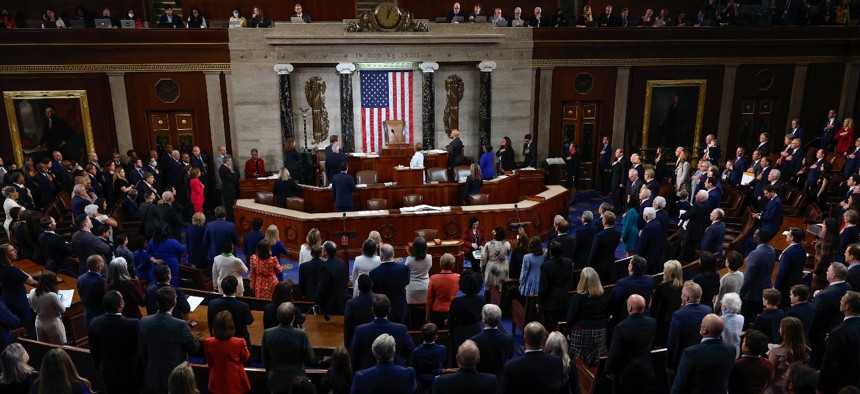House Republicans are looking to cut agencies or specific feds' pay by reviving the 'Holman Rule'

Members of the 118th Congress stand for the Pledge of Allegiance on the first day of the 118th Congress in the House on Jan. 3, 2023. Chip Somodevilla/Getty Images
The new Congress already has its eyes set on slashing funding at some agencies, and eliminating others altogether.
The House is set to approve a measure that will make it easier for lawmakers to eliminate federal agencies or slash the pay of individual employees.
As part of a rules package governing the 118th Congress, House Republicans will allow individual lawmakers to reduce the number of federal workers at specific agencies or cut their compensation as a provision of or an amendment to an appropriations bill. The passing of the rules package will be one of the first agenda items once a House Speaker is elected.
The legislative policy, known as “the Holman Rule,” dates back to the late 19th century and was last revived in 2017. Democrats eliminated the provision when they took control of the House in 2019.
The rule also allows lawmakers to target specific federal programs or offices. Conservative House lawmakers have suggested they will use the authority to go after agencies like the FBI or to zero-out funding for specific federal investigations. Specific personnel who have drawn the ire of the Republican caucus, such as Homeland Security Department Secretary Alejandro Mayorkas, could also face the Holman Rule’s weaponization.
Prior to 2017, the rule had not been in place since 1983. Republicans during the Trump administration sought to use the provision to target employees at the Congressional Budget Office, State Department and Defense Department, but none of those amendments were adopted.
The rule does not allow for broad-ranging firing authorities; cuts must be aimed at specific entities and cannot be contingent on future events. The rule will allow lawmakers to slash the workforce or compensation for employees only at the agencies covered by the specific spending bill in which the provision or amendment is included.
Application of the Holman Rule could prove difficult, with Democrats retaining control of the Senate. If the House were able to adopt any amendments using the provision, however, it could complicate passage of the appropriations bills necessary to keep agencies open.
Democrats were quick to criticize the initiative, calling it archaic and a reversion to the Trump administration’s “war on the federal workforce.”
The rule is “nothing more than a backdoor way for MAGA Republicans to dismantle the federal workforce and carry out political vendettas at the expense of career civil servants,” said Rep. Gerry Connolly, D-Va. “House Democrats will stand up for our brave, professional and experienced federal employees and oppose GOP efforts to throw us back into a patronage system.”
Republicans have already made clear which agency they will target first, though they will—at least initially—do so through an independent bill and not the Holman Rule. After the House approves the rules package, it is slated to vote on a measure revoking $80 billion in funding for the Internal Revenue Service. The Family and Small Business Taxpayer Protection Act would rescind the 10-year cash infusion Democrats provided last year to IRS as part of the Inflation Reduction Act. The funding is set to boost enforcement and customer service efforts after massive hiring surges at the agency. The law restricts enforcement efforts to high earners and corporations, though Republicans have insisted it will lead to the agency harassing low and middle-income Americans. The measure will likely be dead on arrival in the Senate.
House Republicans will also make clear their intention to target federal offices through another part of their rules package, which suggests agencies set oversight plans that “may make recommendations to consolidate or terminate duplicative or unnecessary programs and agencies.” Republicans most recently demonstrated their desire to slash certain federal entities when the Trump administration proposed eliminating 19 agencies, but none of those efforts were successful.



